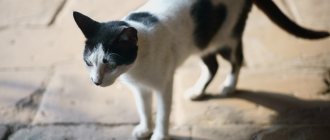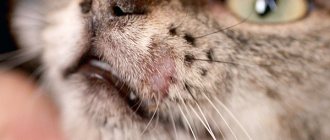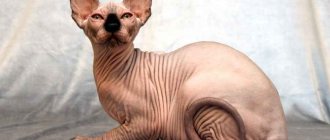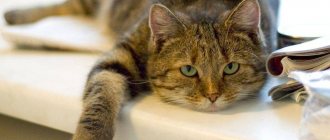Cats are capable of making a wide variety of sounds: from rhythmic purring and gentle meows to prolonged loud howls and snake hisses. The “sound background” depends on the physiological state and emotions, well-being and needs of the pet. Sick cats may cough, sneeze, wheeze, and sniffle. But sometimes the animal makes a sound when breathing, reminiscent of a short snore or grunt. What are the reasons for such a reaction? And is the “grunting state” dangerous to the pet’s health?
Why this can happen: natural predisposition
If you are the owner of an “English” or a Persian cat, then you will most likely have to come to terms with his “oddities”. The fact is that animals of these breeds belong to the so-called brachycephalic varieties. This is the “scientific” name for mammals that have a shortened head with a characteristic “flat” muzzle.
In the process of breeding such animals, breeders encountered a lot of difficulties. So, the same Persians have a lot of genetic anomalies, many of which are tied to the genome, which provides these animals with a shortened full face of the skull. Whatever one may say, from a natural point of view such a structure is nonsense. In particular, all cats of these varieties are extremely unstable to the effects of very high and low temperatures: the air simply does not have time to warm up or, on the contrary, cool down in their nasal cavity.
In winter, Persians, Britons and cats similar to them constantly catch colds (they should not be allowed outside at all when the ambient temperature drops below 10° Celsius). In the summer, it’s hard and difficult for them to breathe in the heat - hence the “grunting”. Because of this, your pet regularly sneezes when he gets into a dusty room: his respiratory organs simply do not have time to filter everything. But there may be more to it than that.
The problem also lies in the structure of the soft tissues of their palate. Over time, especially in old pets, it can simply “sag,” thereby blocking the normal flow of air. Because of this, the animal becomes even more like a pig. In principle, there is no particular problem here, but... if the grunting becomes incessant, and your cat cannot sleep normally due to “heroic” snoring, we strongly advise you to take him to the veterinarian. It is quite possible that he will need surgery to correct the structure of the soft palate. During the intervention, the surgeon will cut off the “extra” parts that interfere with the normal passage of air. Another sign that “clearly hints” at the need for such a procedure is vomiting, which occurs with particularly strong “grunting”. But there are other causes of grunting breathing, many of which are not so “harmless”.
Purr
After a busy day at work, you feel happier when your cat snuggles up to you, sniffs and purrs. Like oh, purring is like how blind and deaf kittens communicate with their mother, but all cats use this means of communication throughout their lives, even with you. Pay close attention to your cat's purrs and you'll notice subtle changes in tone and vibration, all of which indicate that your cat is happy and well.
A lesser-known meowing motif: cats can use these sounds to calm themselves when they're scared, so don't forget to show her some love when you hear her "little motor."
"Parasitic" problems
It is known that finding a cat that has not had helminths in its life is a task that is almost impossible in practice. It is extremely easy to “pick up” a parasite for a cat - he does not wash his paws with soap. On the contrary, our clean pets constantly lick their fur, to which anything can stick. For example, parasite eggs. Professional veterinarians generally recommend treating their pets with antiparasitic agents at least once a quarter, since otherwise problems cannot be avoided. Moreover, this must be done at intervals of two weeks...
Hiss
When a cat hisses and even growls, this does not mean that she is angry - most likely, she is scared and thus trying to defend herself. Your pet may hiss at a stranger who comes into your home (or, for that matter, someone he knows but just doesn't like), or even at another cat, warning him that he must “step back.” The cat ends up showing everyone who's boss (hint: it's not you).
“If you can,” advises Animal Planet, “ignore the hiss. Don't yell at her or confuse her." Just wait a little, after that it will stop hissing. Give your pet the space she needs to calm down and she will feel safer.
Inflammation of the trachea
It is also “tracheitis”. It occurs due to many reasons, with the leading one being the effect of too low temperatures. Your cat, just like a person, can get very cold in frosty or chilly weather. Hypothermia contributes to the deterioration of the animal’s body’s defenses, as a result of which the rapid growth and development of pathogenic and conditionally pathogenic microflora begins. The logical result is that the animal breathes poorly through its nose, making grunting, wheezing and wheezing sounds. But the main symptom of tracheitis is cough.
Meow
“Meow” is the most characteristic sound of a pet. And it can have many different meanings.
In the wild, kittens meow to get their mother's attention, as the American Society for the Prevention of Cruelty to Animals (ASPCA) explains. Adult cats usually don't do this.
But with pets the situation is completely different. They meow at any age. This is how they communicate with their owners, greet them and ask for food and attention, the ASPCA adds.
There is a possibility that animal rights activists will learn to distinguish between the meows of one cat in the future. When it comes to food, the animal makes some kind of strong cry, and a rather bright, pleasant sound as a greeting.
Foreign bodies
Just like a person, a cat may well choke while eating. Sometimes a couple of minutes are enough for him to cough properly, but sometimes an unsuccessfully swallowed piece of food can end up in the lumen of the respiratory tract. This is fraught not only with the development of “grunting” breathing, but also with something more serious, including the possibility of death from suffocation.
If your cat suddenly starts grunting, wheezing and coughing immediately after eating, call the vet immediately! Even in mild cases, when a foreign body only partially blocks the lumen, all visible mucous membranes of the pet quickly turn blue and become engorged with blood . The result is death from suffocation or severe pulmonary edema . Of course, you can try to remove the foreign body yourself, but in cases where you do not have the appropriate veterinary or medical experience, you should not do this. You will only aggravate the pathological process and possibly injure the animal.
Unfortunately, pieces of unsuccessfully swallowed food are not the worst thing. A similar clinical picture can be caused by tumors, not only benign, but also malignant . Grunting in such cases develops gradually. Neoplasms, as a rule, take a long time to grow, and therefore owners may not attach much importance to the pet’s strange behavior.
Thus, all the strange sounds that your cat begins to make are a reason for an immediate visit to the clinic. Perhaps in this way you will save his health and even his life.
Pharyngeal (pharyngeal) reflex
This condition is also called “paroxysmal breathing” or “reverse sneezing.” It is not a disease, but it looks quite alarming and unusual.
Paroxysmal breathing is recorded not only in cats, but also in dogs and people.
According to felinologists, its cause is irritation of the soft palate, resulting in a kind of spasm. At the same time, the animal rests on its forelimbs, stretches its neck, arches its back and produces sounds reminiscent of a noisy short breath, sneezing, coughing and grunting at the same time.
Causes. The condition can be provoked by:
- emotional state and stress;
- quickly eating or drinking liquids;
- inhalation of cigarette smoke, dust, pollen and other allergens;
- pungent odors;
- respiratory infections;
- squeezing the throat with a harness.
Progression and diagnosis. Usually the cat copes with an attack of reverse sneezing on its own, however, if the respiratory abnormality becomes more and more obvious, then perhaps the animal really is sick. In particular, a gradual increase in symptoms is caused by neoplasms growing in one or another part of the respiratory tract. The owner will be able to independently diagnose them only if the tumors become too large and manifest themselves externally, or enter the decay phase and begin to bleed. Ultrasound diagnostics and x-rays will help dispel all doubts.
Reasons for appearance
There are many reasons why a cat coughs.
| Causes of cough | Rationale |
| Allergy | Irritating factors are often dust, household detergents, aerosols, toilet litter, food, and paints and varnishes. In spring and summer, many animals suffer from allergies to flower dust. A reflex act occurs in pets when they are kept in a room where they smoke; |
| Ingestion of foreign objects into the respiratory system | The reason why a cat coughs, as if regurgitating, is bones, small objects, hairballs; |
| Asthma | The cause of a lingering cough and deterioration in the pet’s general condition may be bronchial asthma. The disease is associated with a genetic predisposition and often develops against the background of an existing allergy |
| Worm infestations | A common reason why a cat coughs is helminths. Owners mistakenly believe that only parasites living in the gastrointestinal tract pose a danger to animals. Lung worms are no less dangerous than intestinal worms. The cause of cough can be Toxocara larvae, which enter the bronchi, as well as adult nematodes and trematodes, for example, the causative agent of capillariasis; |
| Pneumonia | Inflammation of the lungs is accompanied not only by a hysterical cough, rejection of exudate, but also by a lethargic state and an increase in temperature; |
| Viral respiratory diseases | Infectious rhinotracheitis, calcivirosis and other viral and bacterial infections are accompanied by damage to the respiratory system and cough. Viral diseases are characterized by fever, refusal of food, and depressed general condition; |
| Heart diseases | A dull chronic cough, pale mucous membranes, and shortness of breath in a pet may indicate the development of cardiac pathology. |
When a cat coughs and sneezes, what should the owner do in such a situation? First of all, it is necessary to carefully observe the pet, understand the nature and characteristics of the reflex act. A variety of factors leading to coughing require a qualified examination of the animal by a specialist. Self-diagnosis can lead to a deterioration in the animal’s condition, and in some cases (foreign bodies in the trachea) even to death.
Cat distress call
The distress call is made almost exclusively by kittens during their first weeks of life. These calls are simply translated to Mom, I need you. The sound is similar to a meow, but the kitten makes it very loud and very loud. Scope to communicate urgency or imminent danger. They make these sounds if they are trapped, very hungry, cold, etc...
How many sounds can a cat make???
The question of how many sounds cats can make is difficult to answer, even for some feline etiology experts. It is now believed that cats can produce over 100 different vocalizations . However, there are 11 sounds that cats use the most in their daily communication.
It is important to emphasize that each cat is a unique and special individual, so each family may have its own vocabulary of cat sounds. That is, each cat can use different sounds to get what it wants. They will also use these different sounds to communicate their emotions, thoughts and moods to other members of their environment...
Trilling
This word is unusual for us. It is used in specialized foreign literature. It can be translated as “bringing out trills.”
This is the sound cats use to greet.
Sometimes cats make cooing, almost bird-like sounds. They differ in sound and meaning. Cat trills attract attention. It's a way of saying, "Look at me."










